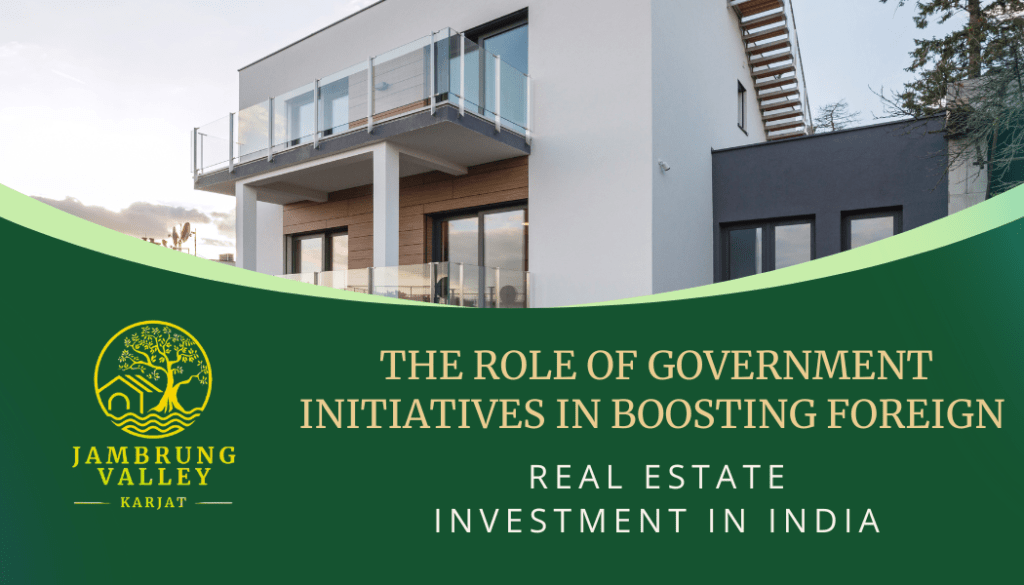
The Role of Government Initiatives in Boosting Foreign Real Estate Investment in India
India’s real estate sector has undergone a remarkable transformation over the past decade, evolving into a globally attractive destination for foreign real estate investors. A significant factor behind this growth is the proactive approach taken by the Indian government through a series of strategic reforms and policy initiatives. These efforts have increased transparency, improved regulatory frameworks, and provided a more investor-friendly environment. As a result, Foreign Direct Investment (FDI) in Indian real estate has surged, making it one of the most dynamic sectors in the country’s economic landscape.
Liberalized FDI Norms: A Game Changer
One of the most influential government moves was the liberalization of FDI norms in real estate. Currently, India allows 100% FDI under the automatic route in townships, housing, built-up infrastructure, and construction development projects. This means foreign investors do not need prior government approval to invest, significantly reducing red tape and speeding up the investment process.
Moreover, the minimum lock-in period and area development requirements have been relaxed, making India even more accessible to institutional investors, sovereign wealth funds, and high-net-worth individuals (HNIs) from abroad.
Real Estate Regulation and Development Act (RERA): Ensuring Transparency
Enacted in 2016, RERA is a landmark regulation that brought much-needed transparency and accountability to the Indian real estate sector. For foreign investors, who often hesitate due to regulatory uncertainty in emerging markets, RERA serves as a safety net.
By mandating project registration, financial disclosures, timelines, and legal accountability, RERA has helped restore trust in the market. This regulatory oversight encourages foreign portfolio investment (FPI) by offering a more structured and secure environment for capital deployment.
Smart Cities Mission: Building Investor Confidence
The Indian government launched the Smart Cities Mission to transform 100 cities into modern, technologically advanced urban centers. These cities focus on infrastructure development, sustainable energy, digital governance, and mobility solutions—factors that significantly increase the real estate value in the region.
Foreign investors are naturally drawn to smart cities due to their future-ready infrastructure and higher capital appreciation potential. Cities like Pune, Ahmedabad, Indore, and Bhopal are seeing increased foreign investment in residential, commercial, and mixed-use properties due to their inclusion in this flagship mission.
REITs: Opening Doors for Foreign Institutional Investors
The introduction of Real Estate Investment Trusts (REITs) in India has been another strategic move to attract foreign investment. Approved by SEBI, REITs offer investors a regulated, liquid, and transparent vehicle to invest in commercial real estate without directly owning property.
Ease of Doing Business Reforms
India has steadily climbed the World Bank’s Ease of Doing Business Index, largely due to the digitalization of processes, single-window clearances, and improved legal frameworks. Real estate transactions are now more streamlined, land records are digitized, and construction permits are faster to obtain—all thanks to government reforms.
This ease of doing business sends a strong signal to international investors that India is open for business and capable of handling foreign investment efficiently.
Tax Incentives and Regulatory Clarity
To attract more foreign capital, the Indian government has offered tax reliefs on capital gains, repatriation of income, and simplified compliance structures for foreign investors. Double Taxation Avoidance Agreements (DTAAs) with over 80 countries ensure investors are not taxed twice on the same income, improving overall net returns.
The introduction of Goods and Services Tax (GST) has also unified the indirect tax structure, creating a more predictable tax environment for investors in construction and property development.
Affordable Housing Initiatives and PMAY
The Pradhan Mantri Awas Yojana (PMAY) and other affordable housing schemes have opened a new segment for impact-oriented foreign investors who prioritize sustainable and inclusive development. With government subsidies, infrastructure status for affordable housing, and growing demand in Tier-2 and Tier-3 cities, this segment is now viable for global capital inflow.
Jambrung Valley: A New Frontier for Smart Investment
Amidst the spotlight on metro cities and industrial zones, Jambrung Valley, nestled near Karjat in Maharashtra, stands as an emerging gem for foreign investors. Strategically located within reach of the Mumbai Metropolitan Region (MMR) and supported by new infrastructure projects like the Mumbai Trans-Harbour Link and Karjat-Panvel railway upgrades, Jambrung Valley is rapidly gaining attention.
Surrounded by natural beauty, waterfalls, and mountain ranges, the region offers a luxury villa experience in a serene environment. As smart city influence expands around Karjat and neighboring regions, Jambrung Valley becomes a logical choice for global investors looking for scenic yet strategically positioned real estate investments.
With eco-conscious development, proximity to urban hubs, and upcoming smart infrastructure, Jambrung Valley offers high appreciation potential, lifestyle value, and investor security—a rare combination in today’s volatile global market.
India’s real estate sector is now a mature, globally competitive investment avenue—thanks largely to visionary government initiatives that have removed traditional roadblocks and enhanced investor confidence. From liberalized FDI norms and regulatory safeguards to infrastructure and digital governance, the government’s efforts have fundamentally reshaped the investment landscape.
For foreign investors looking beyond the obvious metro markets, destinations like Jambrung Valley offer the perfect blend of nature, infrastructure, and futuristic planning—making them ideal for long-term, high-return investment.



